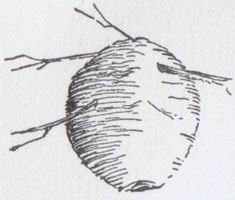|
1999-2004 (Return to Web Text-ures) |
Click Here to return to |
|
1999-2004 (Return to Web Text-ures) |
Click Here to return to |
SUPERSTITIONS ABOUT WASPS
 WASPS were augurs of evil in ancient days, and
we are told that in the year 190 B.C., “an infinite number of wasps flew into
the market at Capua, and sat in the temple of Mars. They were with great
diligence taken and burnt solemnly. Yet they did foreshadow the coming of the
enemy and the burning of the city.”
WASPS were augurs of evil in ancient days, and
we are told that in the year 190 B.C., “an infinite number of wasps flew into
the market at Capua, and sat in the temple of Mars. They were with great
diligence taken and burnt solemnly. Yet they did foreshadow the coming of the
enemy and the burning of the city.”
Wasps were also looked upon as weather prophets, and probably are still as reliable as ever they were in that capacity.
If hornets build high it is a sign the winter will be dry and mild; if low, the winter will be cold and stormy. Hence the following popular rhyme, --
|
“If hornets build low, Winter storms and snow; If hornets build high, Winter mild and dry.” |
This old superstition was probably founded upon the belief that hornets remain in their nests during the winter, in which case they would be safer to build low when a hard season was at hand. Probably a truer prediction is that made by an observant gamekeeper who said that the height at which wasps make their nests above the water is a rough index of the amount of rain expected during the summer. In a wet season they choose the top of the bank near a brook, in dry they may build almost at the water's level.
It was once believed that hornets flying late in autumn foretold storms at sea. This seems a less reasonable prediction than the one where it is said, if wasps are seen flying about in great numbers toward evening, it is a sign that the next day will be fair and hot; but if they enter their nests often at twilight, as if to hide or shelter themselves, that is a sign of stormy weather.
For wasps, hornets, and gnats to bite more eagerly than usual is a sign of rainy weather.
There is a superstition in England, and also in some parts of America, that the first wasp seen in the season should be killed, thereby insuring good luck and freedom from enemies throughout the year.
Opposed to this is the belief that the first wasp seen should not be killed, and many people consider it bad luck ever to kill a wasp.
If a wasp stings you, it is a sign your foes will get the best of you.
If the first wasp of the season is seen in your house, that is a sign you are to form an unpleasant acquaintance, while if the first bee is seen in your house, you are to form a pleasant acquaintance.
If wasps build in a house, it is a sign the occupants of that house are coming to want.